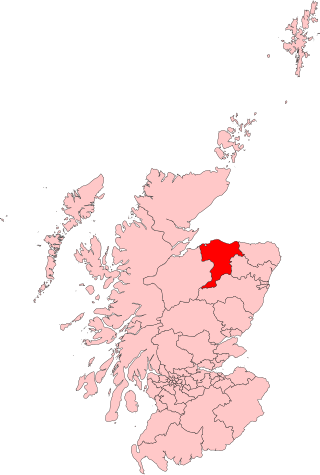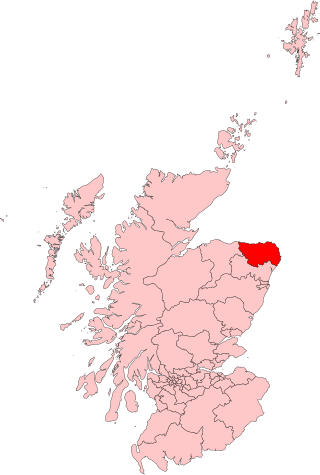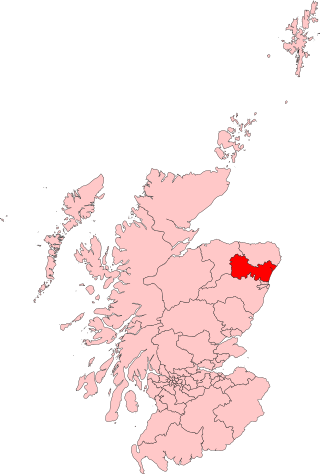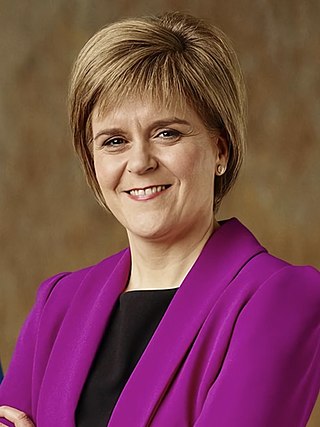Margaret Anne Ewing was a Scottish politician and journalist. She served as a Scottish National Party (SNP) Member of Parliament for East Dunbartonshire from 1974 to 1979 and Moray from 1987 to 2001, and was the Member of the Scottish Parliament (MSP) for Moray from 1999 until 2006.

James Alexander Stewart Stevenson is a Scottish former politician who served as Minister for Transport, Infrastructure and Climate Change from 2007 to 2010 and Minister for Environment and Climate Change from 2011 to 2012. A member of the Scottish National Party (SNP), he was Member of the Scottish Parliament (MSP) for Banffshire and Buchan Coast, formerly Banff and Buchan, from 2001 to 2021.
ProLife Alliance (PLA) or simply ProLife, was an anti-abortion, single-issue political party that was active in the United Kingdom from 1996 to 2004. Since that time it has continued as an advocacy group. It is opposed to any form of euthanasia and opposes human cloning, abortion and experiments on human embryos. It supports guaranteed maternity and paternity leave. Its leader is Dominica Roberts.
Douglas Henderson was a Scottish politician. He was Depute Leader of the Scottish National Party (SNP) from 1971 to 1973 and from 1979 to 1981. He served as a Scottish National Party Member of Parliament (MP) for East Aberdeenshire from 1974 to 1979, and held virtually every national office in the SNP, short of party leader. His political style has been described as "no-nonsense" and "very blunt and forthright". He was also known for his forceful public speaking, which former SNP leader Alex Salmond described as "messianic".

Moray was a county constituency of the House of Commons of the Parliament of the United Kingdom. It elected one Member of Parliament (MP) by the first past the post system of election.

Banff and Buchan was a constituency of the House of Commons, located in the north-east of Scotland within the Aberdeenshire council area. It elected one Member of Parliament at least once every five years using the first-past-the-post system of voting.

Gordon was a county constituency of the House of Commons of the Parliament of the United Kingdom (Westminster), which elected one member of Parliament (MP) by the first past the post system of election. The constituency was first contested at the 1983 UK general election; and underwent boundary changes throughout its existence.

East Renfrewshire is a constituency of the UK House of Commons, to the south of Glasgow, Scotland. It elects one Member of Parliament (MP) using the first-past-the-post system of voting.

Scottish Labour, is the part of the UK Labour Party active in Scotland. Ideologically social democratic and unionist, it holds 22 of 129 seats in the Scottish Parliament and 37 of 57 Scottish seats in the House of Commons. It is represented by 262 of the 1,227 local councillors across Scotland. The Scottish Labour party has no separate Chief Whip at Westminster.

Scotland has elections to several bodies: the Scottish Parliament, the United Kingdom Parliament, local councils and community councils. Before the United Kingdom left the European Union, Scotland elected members to the European Parliament.

The 2011 Scottish Parliament election was held on Thursday, 5 May 2011 to elect 129 members to the Scottish Parliament.

The 2007 Scottish Parliament election was held on Thursday 3 May 2007 to elect members to the Scottish Parliament. It was the third general election to the devolved Scottish Parliament since it was created in 1999. Local elections in Scotland fell on the same day.
Canon Kenyon Edward Wright was a priest of the Scottish Episcopal Church and a political campaigner. Wright chaired the Scottish Constitutional Convention (1989–1999), which laid the groundwork for the creation of the devolved Scottish Parliament in 1999.
The 2008 Glasgow East by-election was a by-election for the UK Parliamentary constituency of Glasgow East which was held on 24 July 2008. The election was triggered when, on 30 June 2008, the sitting MP David Marshall stood down due to ill health.
This article lists the British National Party's election results in the UK parliamentary, Scottish parliamentary and Welsh Assembly elections, as well as in the European Parliament elections and at a local level.
Eilidh Whiteford is a Scottish National Party (SNP) politician who served as the Member of Parliament for the constituency of Banff and Buchan from 2010 to 2017.

Banffshire and Buchan Coast is a constituency of the Scottish Parliament (Holyrood) covering parts of the council areas of Aberdeenshire and Moray. It elects one Member of the Scottish Parliament (MSP) by the first past the post method of election. It is one also of ten constituencies in the North East Scotland electoral region, which elects seven additional members, in addition to ten constituency MSPs, to produce a form of proportional representation for the region as a whole.

The 2016 Scottish parliament election was held on Thursday, 5 May 2016 to elect 129 members to the Scottish Parliament. It was the fifth election held since the devolved parliament was established in 1999. It was the first parliamentary election in Scotland in which 16 and 17 year olds were eligible to vote, under the provisions of the Scottish Elections Act. It was also the first time the three largest parties were led by women.

Christopher Charles Stephens is a Scottish National Party politician who was the Member of Parliament (MP) for Glasgow South West from 2015 until 2024. He was SNP Spokesperson for Justice and Immigration between September 2023 to July 2024.

A general election was held in the United Kingdom on 7 May 2015 and all 59 seats in Scotland were contested under the first-past-the-post, single-member district electoral system. Unlike the 2010 general election, where no seats changed party, the Scottish National Party (SNP) won all but three seats in Scotland, gaining a total of 56 seats. The SNP received what remains the largest number of votes gained by a single political party in a United Kingdom general election in Scotland in British history, breaking the previous record set by the Labour Party in 1964 and taking the largest share of the Scottish vote in sixty years, at approximately 50 per cent.












